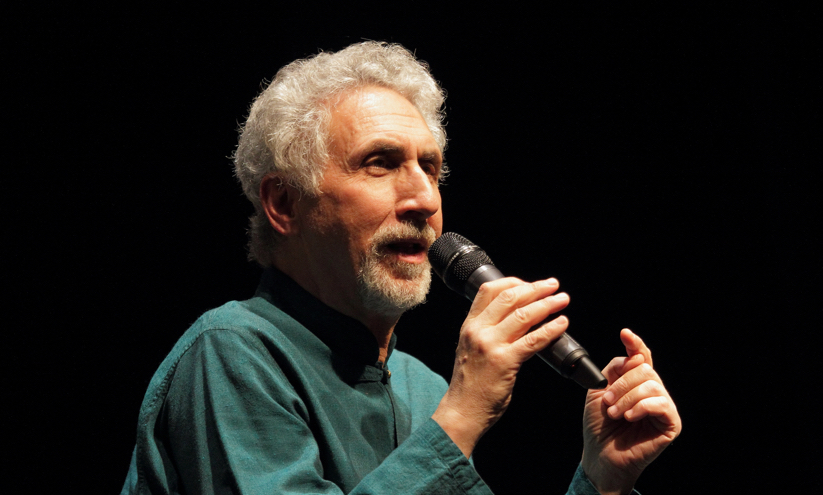Moshe Denburg 莫協.丹伯格
 Moshe Denburg, who hails from a well known Montreal Rabbinical family, came to the West Coast of Canada in 1982. His musical career has spanned 5 decades and his accomplishments encompass a wide range of musical activities, including Composition, Performance, Music Education, and Artistic Direction. He is the founder of the Vancouver Inter-Cultural Orchestra (VICO) and has been involved in its evolution since its inception in the year 2001. He has studied music extensively, both formally and informally, and for the past 35 years has been engaged in exploring the musical resources of the non-Western world, creating music that challenges musicians of differing disciplines to work together across aural/written cultural divides, and to find a common musical aesthetic. He has traveled worldwide, living and studying in the United States, Israel, India and Japan. From 1986 to 1990 he studied composition with John Celona at the University of Victoria, Canada. He has written a large number of works which have been performed, recorded, and broadcast at festivals and on the radio both in Canada and abroad. He is the recipient of many Canada Council grants and commissions and is an associate composer of the Canadian Music Centre.
Moshe Denburg, who hails from a well known Montreal Rabbinical family, came to the West Coast of Canada in 1982. His musical career has spanned 5 decades and his accomplishments encompass a wide range of musical activities, including Composition, Performance, Music Education, and Artistic Direction. He is the founder of the Vancouver Inter-Cultural Orchestra (VICO) and has been involved in its evolution since its inception in the year 2001. He has studied music extensively, both formally and informally, and for the past 35 years has been engaged in exploring the musical resources of the non-Western world, creating music that challenges musicians of differing disciplines to work together across aural/written cultural divides, and to find a common musical aesthetic. He has traveled worldwide, living and studying in the United States, Israel, India and Japan. From 1986 to 1990 he studied composition with John Celona at the University of Victoria, Canada. He has written a large number of works which have been performed, recorded, and broadcast at festivals and on the radio both in Canada and abroad. He is the recipient of many Canada Council grants and commissions and is an associate composer of the Canadian Music Centre.
composer Moshe Denburg talks about his work “Ocean of Tears”, before the performance by the Sound of Dragon Ensemble
“Ocean of Tears” (2020, 2021) – Moshe Denburg (Vancouver) 12’30”
for dizi, flute, erhu 1, gaohu or violin, guitar, ruan, cello, percussion
《淚海》- 莫協.丹伯格,笛子、長笛、吉他、二胡、高胡或小提琴、阮、大提琴、打擊
The Ocean of Tears is meant to be a sonic picture of sadness and of reflection. It was embarked upon after a commission was secured from the Canada Council for the Arts. Maestro Chih-Sheng Chen of the Little Giant Chinese Chamber Orchestra of Taiwan, and Lan Tung, leader of the Sound of Dragon Ensemble (Vancouver, Canada), suggested that I compose a work in two variations – one for Maesto Chen’s Chinese Chamber Orchestra, and a second arrangement for the Sound of Dragon Ensemble. Providentially, the commission was secured just before the COVID19 pandemic was declared, in March of 2020, so I was gainfully at work during the months of social distancing in 2020!
The challenge I presented myself was to evoke a sense of sadness utilizing the Chinese instrumentarium. I have always found Chinese instruments – not all but overall – to be bright in timbre, evoking almost a celebratory sound. Feelings of sadness, to my ears, require somewhat darker timbres. The Ocean of Tears tries to utilize melodies and harmonies that accord with this more sombre mood.
I tried to reflect upon the sadness in our world today, partly due to the pandemic, but also due to changing political and social configurations which seem to be making us forget our connectedness, and in fact to emphasize our separateness. It is only when we share in the consciousness of the sadness that all human beings are heir to, that we are able to overcome disunity. So, as with much of music, and indeed with art in general, The Ocean of Tears is an attempt to take a step towards this much needed awareness of our common humanity.
